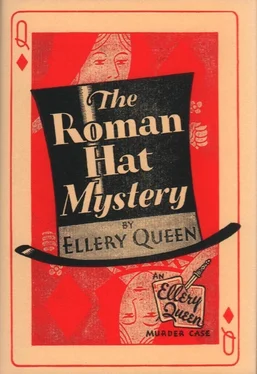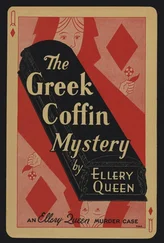“Why is this policeman keeping us here, Mr. Panzer? I’ve a right to leave, I should like you to know! I don’t care if an accident did happen — I had nothing to do with it — that’s your affair — please tell him to stop this silly disciplining of innocent people!”
The little man stammered, trying to escape. “Now, madam, please. I’m sure the officer knows what he is doing. A man has been killed here — it is a serious matter. Don’t you see... As manager of the theatre I must follow his orders... Please be calm — have a little patience...”
He wormed his way out of her grasp and was off before she could protest.
Doyle, his arms waving violently, stood on a seat and bellowed: “I told you to sit down and keep quiet, the pack o’ you! I don’t care if you’re the Mayor himself, you — yeah, you there, in the monocle — stay down or I’ll shove you down! Don’t you people realize what’s happened? Pipe down, I say!” He jumped to the floor, muttering as he wiped the perspiration from his cap-band.
In the turmoil and excitement, with the orchestra boiling like a huge kettle, and necks stretched over the railing of the balcony as the people there strove vainly to discover the cause of the confusion, the abrupt cessation of activity on the stage was forgotten by the audience. The actors had stammered their way through lines rendered meaningless by the drama before the footlights. Now the slow descent of the curtain put an end to the evening’s entertainment. The actors, chattering, hurried toward the stage-stairs. Like the audience they peered toward the nucleus of the trouble in bewilderment.
A buxom old lady, in garish clothes — the very fine imported actress billed in the character of Madame Murphy, “keeper of the public house” — her name was Hilda Orange; the slight, graceful figure of “the street waif, Nanette” — Eve Ellis, leading-lady of the piece; the tall robust hero of “Gunplay,” James Peale, attired in a rough tweed suit and cap; the juvenile, smart in evening clothes, portraying the society lad who had fallen into the clutches of the “gang” — Stephen Barry; Lucille Horton, whose characterization of the “lady of the streets” had brought down a shower of adjectives from the dramatic critics, who had little enough to rant about that unfortunate season; a vandyked old man whose faultless evening clothes attested to the tailoring genius of M. Le Brun, costumer extraordinary to the entire cast of “Gunplay”; the heavy-set villain, whose stage scowl was dissolved in a foggy docility as he surveyed the frantic auditorium; in fact, the entire personnel of the play, bewigged and powdered, rouged and painted — some wielding towels as they hastily removed their make-up — scampered in a body under the lowering curtain and trooped down the stage steps into the orchestra, where they elbowed their way up the aisle toward the scene of the commotion.
Another flurry, at the main entrance, caused many people despite Doyle’s vigorous orders to rise in their seats for a clearer view. A group of bluecoats were hustling their way inside, their night sticks ready. Doyle heaved a gargantuan sigh of relief as he saluted the tall man in plainclothes at their head.
“What’s up, Doyle?” asked the newcomer, frowning at the pandemonium raging about them. The bluecoats who had entered with him were herding the crowd to the rear of the orchestra, behind the seat section. People who had been standing tried to slip back to their seats; they were apprehended and made to join the angry cluster jammed behind the last row.
“Looks like this man’s been murdered, Sergeant,” said Doyle.
“Uh-huh.” The plainclothes man looked incuriously down at the one still figure in the theatre — lying at their feet, a black-sleeved arm flung over his face, his legs sprawled gawkily under the seats in the row before.
“What is it — gat?” asked the newcomer of Doyle, his eyes roving.
“No, sir — don’t seem to be,” said the policeman. “Had a doctor from the audience look him over the very first thing — thinks it’s poison.”
The Sergeant grunted. “Who’s this?” he rapped, indicating the trembling figure of Pusak by Doyle’s side.
“Chap who found the body,” returned Doyle. “He hasn’t moved from the spot since.”
“Good enough.” The detective turned toward a compact group huddled a few feet behind them and asked, generally: “Who’s the manager here?”
Panzer stepped forward.
“I’m Velie, detective-sergeant from headquarters,” said the plainclothes man abruptly. “Haven’t you done anything to keep this yelling pack of idiots quiet?”
“I’ve done my best, Sergeant,” mumbled the manager, wringing his hands. “But they all seem incensed at the way this officer” — he indicated Doyle apologetically — “has been storming at them. I don’t know how I can reasonably expect them to keep sitting in their seats as if nothing had happened.”
“Well, we’ll take care of that,” snapped Velie. He gave a rapid order to a uniformed man nearby. “Now” — he turned back to Doyle — “how about the doors, the exits? Done anything yet in that direction?”
“Sure thing, Sergeant,” grinned the policeman. “I had Mr. Panzer here station ushers at every door. They’ve been there all night, anyway. But I just wanted to make sure.”
“You were right. Nobody try to get out?”
“I think I can vouch for that, Sergeant,” put in Panzer meekly. “The action of the play necessitates having ushers posted near every exit, for atmosphere. This is a crook play, with a good deal of shooting and screaming and that sort of thing going on, and the presence of guards around the doors heightens the general effect of mystery. I can very easily find out for you if...”
“We’ll attend to that ourselves,” said Velie. “Doyle, who’d you send for?”
“Inspector Queen,” answered Doyle. “I had the publicity man, Neilson, phone him at headquarters.”
Velie allowed a smile to crease his wintry face. “Thought of everything, didn’t you? Now how about the body? Has it been touched at all since this fellow found it?”
The cowering man held in Doyle’s hard grasp broke out, half-crying. “I–I only found him, officer — honest to God, I—”
“All right, all right,” said Velie coldly. “You’ll keep, won’t you? What are you blubbering about? Well, Doyle?”
“Not a finger was laid on the body since I came over,” replied Doyle, with a trace of pride in his voice. “Except, of course, for a Dr. Stuttgard. I got him out of the audience to make sure the man was dead. He was, and nobody else came near.”
“You’ve been busy, haven’t you, Doyle? I’ll see you won’t suffer by it,” said Velie. He wheeled on Panzer, who shrank back. “Better trot up to the stage and make an announcement, Mr. Manager. The whole crew of ’em are to stay right where they are until Inspector Queen lets them go home — understand? Tell them it won’t do any good to kick — and the more they kick the longer they’ll be here. Make it plain, too, that they’re to stick to their seats, and any suspicious move on anybody’s part is going to make trouble.”
“Yes. Yes. Good Lord, what a catastrophe!” groaned Panzer as he made his way down the aisle toward the stage.
At the same moment a little knot of people pushed open the big door at the rear of the theatre and stepped across the carpet in a body.
2
In Which One Queen Works and Another Queen Watches
There was nothing remarkable in either the physique or the manner of Inspector Richard Queen. He was a small, withered, rather mild-appearing old gentleman. He walked with a little stoop and an air of deliberation that somehow accorded perfectly with his thick gray hair and mustaches, veiled gray eyes and slender hands.
Читать дальше












